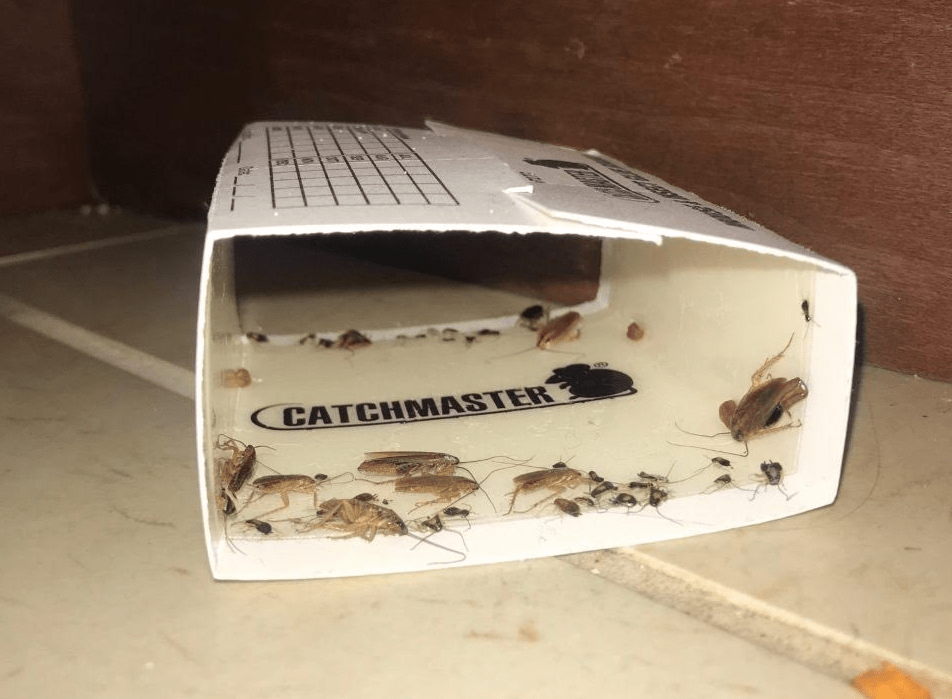Beetle infestation in Eagle Landing apartment causes students alarm
3 min read
An apartment in Eagle Landing has set traps after spraying insecticide to keep their Irish beetle infestation at bay. (Sophie Ahava)
by QUINN BURGARD
Staff Writer
An Irish beetle infestation was discovered inside a suite on the first floor of the Eagle Landing apartments on Feb. 6. The insects were first discovered by the students living in the residence.
Although these sorts of infestations are alarming, they are fairly common on campus, a fact which may be surprising to some students.
“It is not uncommon for Facilities to get rodent work orders from time to time in residences throughout the campus,” said Nolan Akau, the director of Facilities Maintenance Services. “Once the work order is submitted it is given to our contractor either Monday, Wednesday or Friday during their weekly visits and is resolved immediately. It is not uncommon that a follow visit is needed after the initial treatment to treat the residence again.”
Junior communication and digital studies major Haley Denehy is currently living in the suite that is infested. “The first time we saw them, we opened the door to the apartment and we saw them scatter,” said Denehy.
The students put in a pest control work order the day they discovered the beetles and maintenance came to their room four days later on Feb. 10.
“[The maintenance workers] looked around and they said that it was because there was food all over the counter,” said junior marketing and sociology major Sophie Ahava, another student living in the suite. “But all the food was in bags and closed up. We clean all the time. They told us to make sure to take the trash out all the time, have nothing in our sink, and run the dishwasher every night. We thought it was all a little excessive.”
Akau claimed that a common cause for infestations was food products. “Common, but not exclusive, problems found in residences are food products left out, dirty dishes, overflowing trash, poor housekeeping, etc,” Akau said. “Behaviors such as these contribute to inviting uninvited guests in.”
After the original visit, the students were told that maintenance would return to check on the situation in ten days. However, after only four days, the residents found more beetles.
“I was out of town this weekend but [Denehy] was cleaning and she texted me and said that they had just killed one on the ceiling and there were some coming out of the walls and there were more in our bathroom,” said Ahava.
“I put in another work order. They replied to it within an hour and told us that they would come back,” said Denehy. “The following morning I received an email informing us that they were having a company come in.”
The company was to arrive at the suite on Feb. 17. They planned to spray insecticide in an attempt to end the infestation. In the email relaying this information to the suite residents they were also told that they would need to move all the items in the apartment at least twelve inches away from the walls and could not access their room from 10 a.m. to 2 p.m.
“So we had to move all of the beds and all of the furniture,” said Denehy. “We were putting stuff in our friend’s apartment. We were moving everything.”
“We didn’t know what they were spraying, we didn’t know if it was getting on our clothes or our beds,” said Ahava. “We bagged everything up.”
Following the insecticide spraying, the students have had traps placed for the insects all over their apartment. “We have traps under our fridge, under our dishwasher, in our bathroom, under the oven,” said Ahava.
The infestation seems to be clearing up, according to the residents.
“Now we see some crawling because I think they’re dying,” said Ahava. “But other than that it seems to be getting better.”
The students were told that this problem is only isolated to rooms on the first floor, but they said they don’t believe this. “If they’re in the walls, it’s not a first floor problem.” said Denehy.
Overall, the experience with maintenance was a positive one for the students. “We were happy with the way that they responded to it,” said Denehy. “They handled it, but moving everything was a pain.”


